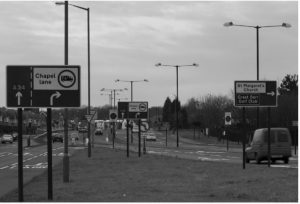This paper, led by the wonderful Dr Maruša Levstek, made use of a unique opportunity to investigate audience responding to The Green Planet Augmented Reality (AR) Experience, one of the largest immersive experiences in the United Kingdom. Attending the AR experience in person was associated with increased sustainability beliefs and behaviours, in comparison with a group who experienced a 2D screen-capture video of the experience. Further analysis suggested that the AR experience induced greater presence and connection with nature than video, leading to greater impact on audiences.
Category: News
New paper: remote control of self-driving cars

Today we published an article highlighting the need to address the human factors challenges that will arise in situations where self-driving cars are controlled by a remote human operator. This is the first article from Clare Mutzenich’s PhD project, and is co-authored by Szonya Durant (RHUL), Shaun Helman (TRL) and Polly Dalton (RHUL Attention Lab). It is fully open access in the journal Cognitive Research: Principles and Implications.
“Furniture” by hartlandmartin is licensed with CC BY-NC-SA 2.0
Attitudes to driverless cars
We recently published a report in which we found that four out of five of the people we surveyed were open to the idea of driverless cars on the UK’s roads. The research was funded by the ESRC and was run in collaboration with TRL as part of Stuart Hyde’s PhD. Double congratulations are due to Dr Stuart, both for the publication of this report and for his successful thesis defence! Click here for more details on the research.
Digital Forest: a new collaboration
We are excited to announce a new collaboration with artist Madi Boyd on Digital Forest – an installation artwork that will be exhibited in April 2018 in Royal Holloway’s new exhibition space.
This multi-sensory moving image installation will be informed by the latest attention research – in particular, the notion that the ‘soft fascination’ provided by natural environments can restore people’s mental resources, helping them to focus their attention. Sculptural forms, tactile encounters and multiple projections, while not mimicking a forest directly, create a ‘natural’ environment within a constructed performative space. In this way visitors to Digital Forest are not only offered a complex and compelling indoor experience, but also one that engages attention in ways that are similar to natural environments, using light, sound, motion and texture. Indeed as well as being ‘art’ in its own right, the work will function as a research environment, hosting a series of scientific experiments to investigate the potential restorative effects of installation art.
New paper: Auditory perceptual load
Our latest paper is a literature review addressing the question of whether perceptual load theory holds within the auditory domain. The research is the second output from our ESRC-funded project ‘The links between attention and tactile awareness‘ and is fully open access in the journal Hearing Research.
Tactile perceptual load
Thanks to everyone who participated in our most recent third year project study run by Flora, Jess, Lida, Louisa and Tuba. The results showed that a high load in an ongoing tactile task reduced noticing of unexpected tactile stimuli, nicely in line with perceptual load theory. We will now be following up these promising findings with some additional studies. Well done to the project group!
Attention Lab in the news
A nice article in today’s Sunday Times (paywall) suggested that our recent paper could explain why people close their eyes when kissing. The story has since been covered by a number of other outlets, including The Independent, The Telegraph and the The Daily Mail. For a more in-depth look at the science you can also hear Sandra and Polly discussing the paper in the pub with friend and colleague Dr Laura Mickes as part of her new Psychology Pubcast series.
New paper: Complex visual tasks reduce tactile sensitivity
Our latest paper, demonstrating that people’s ability to notice tactile stimuli is reduced when they are carrying out a demanding visual task, is released online today. We asked volunteers to perform a letter search task of either low or high visual perceptual load, as well as responding to the presence or absence of a brief vibration delivered simultaneously to one of their hands on half the trials. Their sensitivity to the clearly noticeable tactile stimulus was reduced when they carried out the more taxing visual search task.
The research is the first output from our ESRC-funded project ‘The links between attention and tactile awareness‘ and is fully open access in the Journal of Experimental Psychology: Human Perception and Performance.
Improving helicopter alerts
We are excited to announce our new collaboration with the Safety and Accident Investigation Centre at Cranfield University. The project is funded by the Civil Aviation Authority and is aimed at improving helicopter warning alerts.
Visual attention during driving
 We will soon be starting a new project investigating visual attention in young and elderly drivers. This work will be run in collaboration with Dr Dan Bishop at Brunel University London and is funded by a Royal Holloway Research Strategy grant.
We will soon be starting a new project investigating visual attention in young and elderly drivers. This work will be run in collaboration with Dr Dan Bishop at Brunel University London and is funded by a Royal Holloway Research Strategy grant.
Image: pakorn / FreeDigitalPhotos.net